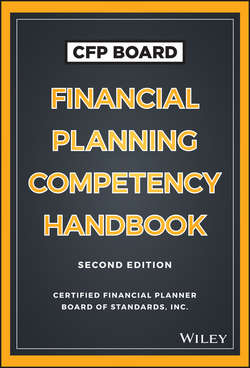Читать книгу CFP Board Financial Planning Competency Handbook - Board CFP - Страница 31
На сайте Литреса книга снята с продажи.
PART One
Introduction
CHAPTER 3
Financial Services Regulations and Requirements
LEARNING OBJECTIVES
ОглавлениеThe student will be able to:
a. Identify the regulatory authorities that impact elements of the financial planning process. (Examples include regulation of accountancy, legal practice, real estate law, insurance regulation, etc.).
b. Differentiate between investment knowledge that is proper to use in the evaluation of securities and insider information.
c. Demonstrate a comprehensive understanding of investment advisor regulation and financial planning aspects of ERISA.
d. Explain the relevant licensing, reporting, and compliance issues that may affect the business model used by a financial planning firm.
Rationale
The purpose of a financial planner having the ability to understand, follow, and adapt to financial services regulations and requirements is to ensure that planning services are provided in a highly ethical manner. Financial planners work in an extremely regulated environment. Consumers, regulators, and planning colleagues expect financial planners to know existing rules and guidelines. While financial planners are assumed to be familiar with the SEC, FINRA, and state securities and insurance regulators, there are a host of other regulatory organizations that impact the work of some financial planners. Examples include the Municipal Securities Rulemaking Board, the National Futures Association, and the major stock exchanges, including the New York Stock Exchange (NYSE) and American Stock Exchange. Additionally, designation and certification organizations, such as Certified Financial Planner Board of Standards, Inc. (CFP Board), enforce rules related to client interactions, ethics, and practice standards.
Of particular importance is the Employee Retirement Income Security Act of 1974 (ERISA). According to the U.S. Department of Labor, ERISA is a federal law that sets minimum standards for pension plans in private industry. ERISA does not require any employer to establish a pension plan. It only requires that those who establish plans must meet certain minimum standards. The law generally does not specify how much money a participant must be paid as a benefit. ERISA requires plans to regularly provide participants with information about the plan including information about plan features and funding; sets minimum standards for participation, vesting, benefit accrual and funding; requires accountability of plan fiduciaries; and gives participants the right to sue for benefits and breaches of fiduciary duty.”33
Fiduciary definitions and rules are also important. Any financial planner who operates or performs functions related to a qualified retirement plan is considered to be a fiduciary. Fiduciaries must act solely in the interest of plan participants and their beneficiaries, be prudent in carrying out duties, follow plan documents (unless inconsistent with ERISA), diversify plan assets, and pay themselves only reasonable expenses. The topic of fiduciary status has expanded beyond retirement planning. An ongoing active debate is unfolding that would require all financial planners to maintain a fiduciary relationship with clients. At this time it is not known whether this will ever occur.
Financial planners should be familiar with all FINRA and SEC licensing and registration requirements. As a reminder, financial planners who provide advice for a fee generally must register either with the SEC or with their state securities enforcement office. Financial planners who work on a commission basis must hold a qualifying license issued by FINRA. Examples of licenses include:
■ Series 6: Investment Company Products/Variable Contracts Limited Representative
■ Series 7: General Securities Representative
■ Series 14: Compliance Officer
■ Series 24: General Securities Principal
■ Series 26: Investment Company and Variable Contracts
■ Series 42: Registered Options Representative
■ Series 52: Municipal Securities Representative
■ Series 63: Uniform Securities Agent State Law
■ Series 64: General Securities Principal
■ Series 65: Uniform Investment Adviser Law
■ Series 66: Uniform Combined State Law
Financial planners who sell insurance products must additionally hold at least one of the following licenses:
■ Life and accident
■ Health
■ Fire and casualty
■ Limited lines automobile
■ Personal lines
Related Content Areas Associated with the Learning Objectives
■ Financial planners must have a strong grounding in SEC regulations and FINRA policies.
■ It is also important that planners understand how financial services regulations and requirements integrate into the planning process.
■ This learning objective is linked with the function, purpose, and regulation of financial institutions, as well as consumer protection laws.
33
Source: www.dol.gov/compliance/laws/comp-erisa.htm.
